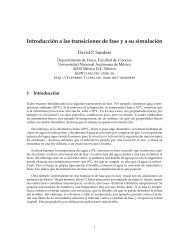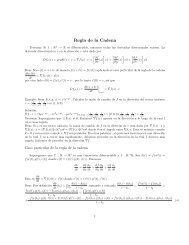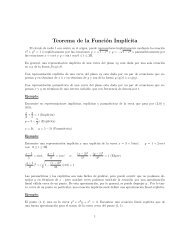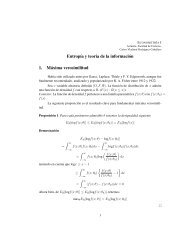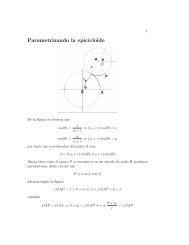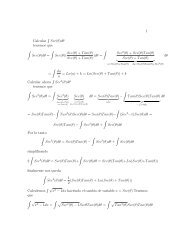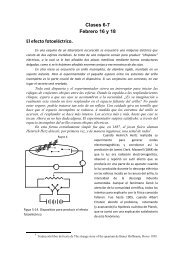"Surely You're Joking, Mr. Feynman!" - unam.
"Surely You're Joking, Mr. Feynman!" - unam.
"Surely You're Joking, Mr. Feynman!" - unam.
You also want an ePaper? Increase the reach of your titles
YUMPU automatically turns print PDFs into web optimized ePapers that Google loves.
have a better idea of what 'essential object' means. Is a brick an essential object?"<br />
What I had intended to do was to find out whether they thought theoretical<br />
constructs were essential objects. The electron is a theory that we use; it is so useful in<br />
understanding the way nature works that we can almost call it real. I wanted to make the<br />
idea of a theory clear by analogy. In the case of the brick, my next question was going to<br />
be, "What about the inside of the brick?" and I would then point out that no one has<br />
ever seen the inside of a brick. Every time you break the brick, you only see the surface.<br />
That the brick has an inside is a simple theory which helps us understand things better.<br />
The theory of electrons is analogous. So I began by asking, "Is a brick an essential<br />
object?"<br />
Then the answers came out. One man stood up and said, "A brick as an<br />
individual, specific brick. That is what Whitehead means by an essential object."<br />
Another man said, "No, it isn't the individual brick that is an essential object; it's<br />
the general character that all bricks have in common their 'brickness' that is the<br />
essential object."<br />
Another guy got up and said, "No, it's not in the bricks themselves. 'Essential<br />
object' means the idea in the mind that you get when you think of bricks."<br />
Another guy got up, and another, and I tell you I have never heard such ingenious<br />
different ways of looking at a brick before. And, just like it should in all stories about<br />
philosophers, it ended up in complete chaos. In all their previous discussions they hadn't<br />
even asked themselves whether such a simple object as a brick, much less an electron, is<br />
an "essential object."<br />
After that I went around to the biology table at dinner time. I had always had<br />
some interest in biology, and the guys talked about very interesting things. Some of them<br />
invited me to come to a course they were going to have in cell physiology. I knew<br />
something about biology, but this was a graduate course. "Do you think I can handle it?<br />
Will the professor let me in?" I asked.<br />
They asked the instructor, E. Newton Harvey, who had done a lot of research on<br />
lightproducing bacteria. Harvey said I could join this special, advanced course provided<br />
one thing that I would do all the work, and report on papers just like everybody else.<br />
Before the first class meeting, the guys who had invited me to take the course<br />
wanted to show me some things under the microscope. They had some plant cells in<br />
there, and you could see some little green spots called chloroplasts (they make sugar<br />
when light shines on them) circulating around. I looked at them and then looked up:<br />
"How do they circulate? What pushes them around?" I asked.<br />
Nobody knew. It turned out that it was not understood at that time. So right away<br />
I found out something about biology: it was very easy to find a question that was very<br />
interesting, and that nobody knew the answer to. In physics you had to go a little deeper<br />
before you could find an interesting question that people didn't know.<br />
When the course began, Harvey started out by drawing a great, big picture of a<br />
cell on the blackboard and labeling all the things that are in a cell. He then talked about<br />
them, and I understood most of what he said.<br />
After the lecture, the guy who had invited me said, "Well, how did you like it?"<br />
"Just fine," I said. "The only part I didn't understand was the part about lecithin.<br />
What is lecithin?"<br />
The guy begins to explain in a monotonous voice: "All living creatures, both plant



